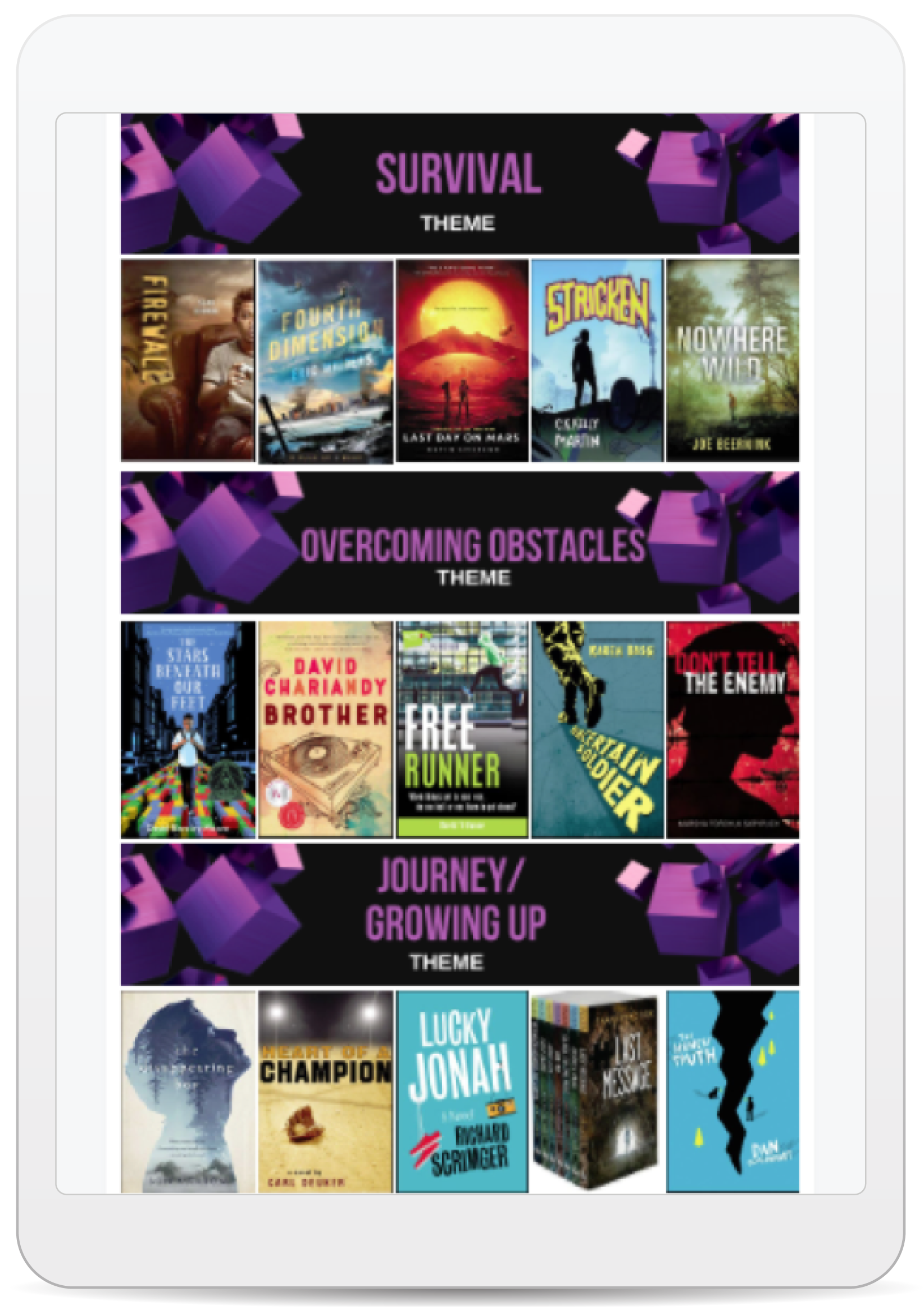The Role of the VLE in HWCDSB
Michael Noronha, the Technology Enabled Learning and Teaching (TELT) contact for HWCDSB, took some time with us to outline how he sees the VLE supporting educators within his district school board. Educators and students can easily connect to Ministry-licensed OSAPAC software, board-provisioned Office 365 tools, TVO resources and more through the VLE, creating a single space where they can access all their digital tools. In 2018, HWCDSB used the VLE for a board-wide Math Professional Activity Day, and in 2019 Michael anticipates they will continue to use the VLE for more PA days. Other unique ways that HWCDSB has used the VLE include to offer a Netflix-esque book club, to support Catholic education and to support students with EQAO test preparations.
The VLE is such a powerful and safe environment with a large variety of rich tools to support differentiated learning. I am excited to see our continued growth for the years to come.
Michelle White, District e-Learning Technical Contact, HWCDSB
HWCDSB Assistant Superintendent on Ontario’s VLE
Greg Tabone is the Assistant Superintendent of Education for HWCDSB. He has made promoting the VLE a priority in his roles as both Assistant Superintendent and School Effectiveness Lead. On a recent PA day, all elementary and secondary teachers were required to log in to the VLE to access the videos and other resources to be used for the day. Feedback was extremely positive. Greg has also tasked HWCDSB TELT contact Mike Noronha with creating short videos on using the VLE to send out to teachers and administration as well as to after-school workshops. Greg’s goal is to have all teachers using the VLE in some way in the next two years.
“Promoting a tool like [the VLE] has been a priority for me in my role as Assistant Superintendent of Education and as School Effectiveness Lead. There are two reasons for this. Firstly, our students need to be prepared for post-secondary education, where this communication tool is being used extensively by most colleges and universities. Preparing our students in our elementary and secondary schools to share, learn and communicate in an online environment is a skill that matches well with our Ontario Catholic School Graduate Expectations. Secondly, training our teachers to use Brightspace [the VLE] enables them to re-examine their own pedagogical practic- es. Because the Brightspace environment allows for immediate feedback, group discussions, uploading and downloading assignments, etc., teachers can look at creating new assessment and evaluation practices reflecting the modification and redefinition stages as in the SAMR model.” — Greg Tabone, Assistant Superintendent of Education, HWCDSB.
HWCDSB has been using the VLE to meet the objectives outlined in their Technology Research Project, which is now in its third year. Areas of focus include:
- Using the VLE to share, learn and communicate in an online environment and meet the Ontario Catholic School Graduate Expectations.
- Deepening learning partnerships between teachers and students, as well as between peers. This can be accomplished with innovative learning spaces, students co-designing learning tasks, new teacher-student partnerships and community-connected experiential learning.
- Transforming assessment practices using differentiating assessment as, of and for learning; ongoing formative assessment
by teachers and peers; global competencies assessment frameworks. - Expanding professional learning models using online/blended learning in the VLE, with job-embedded, external learning/teaching/ research partnerships to provide continuous learning for teachers.

The VLE Is an Integral Part of “For the Love of Reading Book Club
The dynamic duo of Judy Eaton (Student Achievement Consultant for Elementary) and Betty Hicks (Secondary Learning Partner—Literacy Support) created HWCDSB’s first grade 8 and 9 book club (with students attending two separate schools)—using the VLE. Book themes include survival, overcoming obstacles, journey/growing up, and friends and relationships. There were five titles per theme, which allowed students to pick books and themes they were interested in. Judy and Betty used the VLE to create a space on the homepage for pictures of the book covers (which linked to the discussion on each book), and a reading schedule was established to keep everyone on track.

They used the discussion board for online discussion of each book and posted weekly videos using the announcements feature to help the students start the discussion around the weekly topic. Students would log in and join the discussion around the topic. Over the six-week period, topics were discussed by students both face-to-face and through the VLE’s discussion board. An example of a prompt that was used is: “Think of the major conflicts within your novel, focus on one of those conflicts. What advice would you give the character on how to handle the conflict?” To help keep the conversations flowing, Judy and Betty advised students to stick to “one thought, one question, one response.”
Feedback on the book club has been positive from both students and faculty. Students enjoyed the assignment and want to meet each other in person. Judy and Betty presented the project to librarians as well as grade 8 teachers; they liked the project and were interested in trying it with their classes.

How VLE Supported a Math PA Day
To fulfill a province-wide Ministry mandate for a Math Professional Activity day, during which all teachers across all subjects had to take a “Fundamentals of Math” course, Sarah used the VLE to deliver the required content. Sarah found using the VLE for this cross-departmental PA day to be clean and easy, and teachers found the VLE easy to use for this required activity. Follow-up survey responses were positive about the use of the VLE for a PA day.
How HWCDSB Supports EQAO Preparation with the VLE
Anthony Stibano and Sarah Bereziuk support secondary math in HWCDSB. Together, they created EQAO applied and academic preparation courses in the VLE for all grade 9 students in HWCDSB schools. They view their course as a “one-stop shop for everything EQAO.” The courses include open response booklets, prep quizzes, a formula sheet, question banks and a prep guide. Every grade 9 student and teacher has access to the courses. There is also a helpful reminder that lists all the materials students need to bring on EQAO test day.
Feedback and results from the EQAO preparation courses in the VLE have been very positive for HWCDSB. Students and teachers are actively accessing the courses, and the district has seen a positive correlation between students who took the quizzes and level 3-4 success on the EQAO exam. Anthony has noticed some teachers are copying the course content into their own VLE classrooms to get better insight into student results.
I believe that the VLE is a rich resource of digital tools for all educators and students in Ontario. The VLE has radically transformed over the past few years and continues to become both a more user-friendly and mobile-friendly platform. It always keeps safety and security at its core and continues to make great strides in all areas.
Michael Noronha, TELT Contact, HWCDSB
Using the VLE to Support Catholic Faith Development
Teresa Zupancic, Elementary Technology & Digital Learning Consultant, and Andy Burns, Religion and Family Life Consultant, use the VLE to provide HWCDSB staff and students with an online space to unite in prayer and reflection, to explore the beauty of their faith and to encounter Christ through the creation of a Catholic community or sacred space within the VLE. HWCDSB’s online sacred space is used by staff and students to support their community of faith with daily scripture, weekly reflection and prayer activities as well as quotes from saints, religious leaders and models of faith.
During the liturgical seasons of Lent and Advent, Teresa and Andy use the VLE to enroll staff and students into an open course aimed to engage members of the HWCDSB community in daily scripture reflection, prayer and faithful acts, as well as provide them with teachings that align to the liturgical season. Andy and Teresa use the announcement feed to time release of daily posts, like an Advent calendar.
In the sixth year of HWCDSB’s Our Catholic Community, the feedback from staff and students has been positive and reflects regular use. Many classrooms begin the day with Our Catholic Community. Students are excited to reveal the daily posts in their classrooms. The goal of Our Catholic Community was to provide innovative and engaging Christ-centred experiences for all, and with students even accessing the site during the holidays, it is safe to say they are on their way to achieving that goal.

HWCDSB Pilots the Portfolio Tool in Kindergarten at 10 Schools
Natalie Crisante, an Early Years Consultant at HWCDSB, is responsible for streamlining the use of digital portfolios for kindergarten teachers to align with Growing Success standards. Her task was to get everyone to use the same safe, secure Portfolio tool for pedagogical documentation. Teachers in HWCDSB were using various tools to assess and store student artifacts and documentation. Some teachers struggled with which tools to use, others had to sift through hundreds of pictures to discern learning—and they all had a need for pedagogical documentation.
Then they found the VLE’s Portfolio tool, which was exactly what Natalie was looking for. The Portfolio tool gives teachers the ability to align artifacts as pedagogical documentation at the point of capture.
It is safe and secure, and the students’ portfolios move with them from grade to grade. Starting with 10 schools, Natalie set up face-to-face sessions to train kindergarten teachers on the VLE and the Port- folio tool, as well as the Funster (a Portfolio app for non-readers). The Portfolio tool quickly became their sole tool for documentation, and the 10 pilot schools grew to 20. Teachers enthusiastically used the tool with their students, and students like that they can see their work in the VLE. Natalie’s goal is to increase awareness and use of the VLE and the Portfolio tool with all kindergarten teachers in HWCDSB.
Closing
The Virtual Learning Environment is a dynamic learning platform, powered by D2L’s Brightspace. The VLE is provided by the Ministry of Education at no cost to Ontario publicly funded teachers. Ontario’s VLE includes digital portfolios, assignments, rubrics, lessons linked to curriculum expectations, quizzes and much more! All K-12 public school teachers in Ontario have free access to Brightspace through Ontario’s VLE.
To get the VLE for your classroom or school, reach out to your Technology Enabled Learning and Teaching (TELT) contact or email [email protected].
Learn more about Ontario’s VLE at D2L.com/K-12/Ontario

